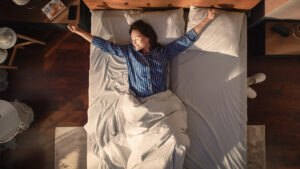Living with chronic pain can be exhausting. The difficulty in falling and staying asleep exacerbates the problem, leaving you even more worn out and overtired. Getting enough sleep, following a well-regulated fitness and exercise routine, and physical therapy can help reduce lower back pain and help you sleep more deeply for longer.
Our team at the Non-Surgical Spine Center is always looking for ways to improve our patient’s discomfort through their normal day-to-day activities. With these tips, you may feel a lot better in the morning and be able to take on far more in your day!
Sleep With Lower Back Pain
Fetal Position
While in general, you’ll want to seek out a position that puts as little strain on the muscles of the lower back as possible, the fetal position, in which the sleeper lays on their side with their knees tucked up and the spine curved forward, may be most comfortable for patients with a herniated or bulging disc. The position draws the spine out, releasing pressure on an aggravated disc, and may provide some relief from the pressure and inflammation causing the pain.
It is interesting to see which conditions lead to which most comfortable sleep. The results vary patient by patient, and what works for someone else may not work for you.

On Your Back
Some sleepers prefer to lie flat on their backs. If this is your preferred position, use a small pillow to support the knees. If there is a gap between your lower back and the mattress, consider using another small pillow to add extra support for the lower back. The idea is to maintain the natural curvature of the spine as closely as possible.
Everyone has different favorite sleeping positions, so we know it can be challenging to change them up. Sleeping on your back with the necessary additions of a pillow can make a huge difference on your back.
On Your Side
When sleeping on your side, place a small pillow between your knees to help align the spine to its natural curve. Avoid sleeping on the same side every night, which can lead to an increase in back strain. Changing sides occasionally helps distribute the load across the lower back muscles and avoids strain.
It is important to recognize these tips, no matter how insignificant they seem. These quick changes can make a world of difference when it comes to your nighttime routine.
Should I Replace My Mattress?
If your mattress has developed a sag or dip, it’s time for a new mattress. While you may find tips online, like sliding a piece of plywood under your mattress, the best solution is to replace a worn-out mattress. Visit your local mattress store and test mattresses for at least 15 minutes to see if they produce fatigue in your back muscles or offer solid support for the spine. Taking good care of your back leads to less pain down the road and helps contribute to a better night’s sleep.
Paying attention to how long you have had your mattress lets you know when to switch them out. If the one you currently use isn’t making the cut, don’t hesitate! You spend too much time using it not to enjoy what comes with it.
Work With The Non-Surgical Spine Center
Your sleep is an essential part of a healthy life. If your back is also struggling, it is time to try new solutions. Are you interested in learning more about our tips for a healthy lifestyle and back? Contact our team today to get started with a consultation. You’ll be feeling better in no time!

Share